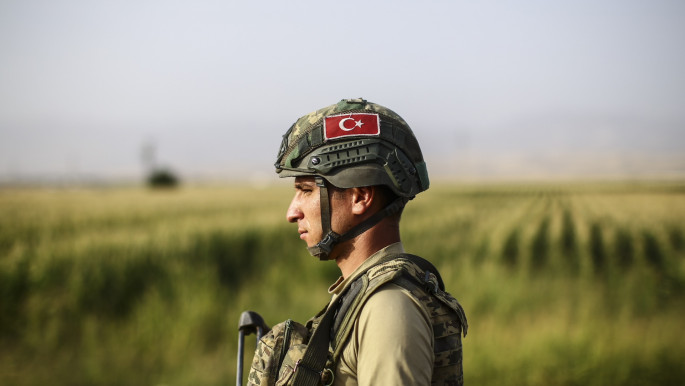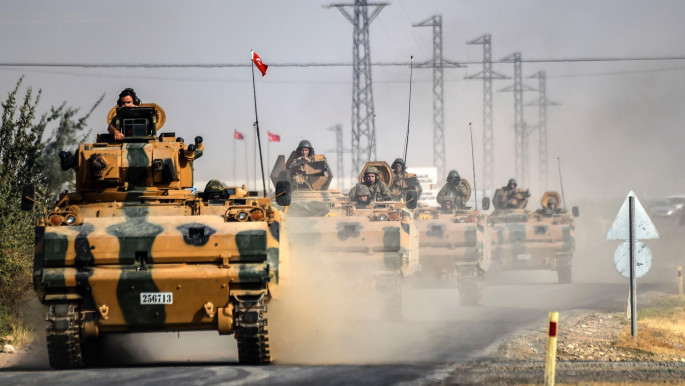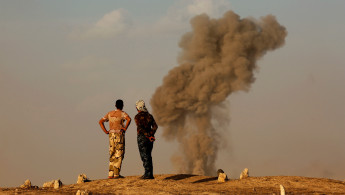Could Iraq's Iran-backed militias arm the PKK if Turkey enters Sinjar?
At the same time, an increasing number of powerful Iran-backed Iraqi Shia militias that oppose such a move from Ankara have deployed to the strategically-important region.
Will these groups ultimately arm or support the PKK militarily against Turkey if Ankara goes ahead and launches an operation? If so, what might the broader regional ramifications of such a move be?
In February, amid these Turkish threats, thousands of militiamen, including members of the powerful Iran-backed Kataib Hezbollah and Asaib Ahl al-Haq factions, arrived in Sinjar pledging to defend the Yazidi homeland from any Turkish incursion.
These militias operate under the umbrella of the Iraqi state-sanctioned Popular Mobilisation Forces (PMF). However, many of the more powerful ones answer directly to Tehran rather than the central government in Baghdad.
"Iran is encouraging these armed groups to deploy in defence of Sinjar," wrote Nussaibah Younis, a visiting fellow at the European Council on Foreign Relations, in her recent analysis of the current situation. "It is keen for them to maintain their dominance of Sinjar because of the strategic importance of the area as a point of access to Syria."
 |
An increasing number of powerful Iran-backed Iraqi militias that oppose Ankara's potential military operation in Sinjar have deployed to the strategically important region |  |
Consequently, in the event of a Turkish ground operation against the PKK and its local affiliate, the Yazidi-majority Sinjar Resistance Units (YBS) in Sinjar, these militias are more likely to side with the PKK. But will they directly support the group or arm it in its fight against Turkey?
"The three PMF brigades recently deployed to the Sinjar area are close to Iran and are known to have access to the short-range ballistic missiles," Emily Hawthorne, Senior Stratfor Middle East and North African analyst at RANE told The New Arab. "However, it is unlikely that these militias would simply transfer such weapons to the PKK, in part because stores of such weapons have attracted attacks and airstrikes by Israel on PMF bases, and because the PMF isn't a close and fast ally of the PKK."
 |
|
| The Iraq Report: Turkey and Iran trade diplomatic blows as tensions mount |
The militias are also not likely to supply the PKK with other sophisticated weapons, such as modern anti-tank missiles or portable shoulder-launched anti-aircraft missiles (MANPADs). When Syria hosted the PKK and supported its campaign against Turkey, it never armed the group with MANPADs because it feared that if the Kurdish fighters successfully shot down any Turkish military aircraft, Ankara might have retaliated directly against Damascus.
"I do not think it is likely that Iran-backed militia groups will transfer weapons to the PKK," Hawthorne said. "Iran-backed groups are more interested in preserving Iranian access to its corridor to Syria than equipping a group that wants to fight Turkey."
"If such an unlikely move did occur, of course, Turkey-Iran diplomatic relations would deteriorate, and Turkey would directly blame Iran."
This, she anticipates, is something Tehran does not want to risk. Rather, Iran wants to preserve its access to Syria and doesn't want to see allied militias in Iraq lose influence and access to territory they gained in recent years, Sinjar being one such example. Also, Iran "does not want to directly create a casus belli with Turkey."
 |
I do think there is a risk of a direct clash on the ground between recently deployed PMF brigades and Turkish troops if Turkey launches an operation in Sinjar |  |
Iran, as with Syria, used to support and give sanctuary to the PKK in the 1980s. When Turkey threatened to invade Syria in 1998 over its support of the PKK, Syrian dictator Hafez al-Assad exiled PKK leader Abdullah Ocalan, who was captured early the following year, to placate Turkey and avert a possible war. Syria and Turkey consequently signed the Adana Agreement in which the former agreed to relinquish its support of the PKK. Iran followed suit in 2003.
Despite militarily coordinating with Turkey against the PKK and its Iranian PJAK affiliate in Iraqi Kurdistan in recent years, Tehran has shown signs that it favours the PKK's continued survival as a hindrance to, or thorn in the side of, Turkey. As Soner Cagaptay wrote in his recent book Erdogan's Empire, "Iran ultimately does not want Turkish-PKK peace."
He went on to recall that during peace talks that led to the short-lived 2013 Turkish-PKK ceasefire agreement, "allegations surfaced that Iran's infamous spymaster, Qasem Soleimani, reportedly met personally with PKK leaders in the mountains of northern Iraq, urging them to quit the peace process, even promising them sophisticated weaponry in return."
Today, Hawthorne doesn't foresee direct clashes between the Turkish military and the PMF militias unless the former "begins to ramp up its Iraq and Syria military operations in a way that threatens Iranian access to its corridor to Syria."
 |
|
| Read more: In Iraqi Kurdistan, civilians count the cost of Turkey's fight against the PKK |
If that happens, then "Iran-backed Iraqi militias on the ground will be compelled to support the PKK because they view the PKK as an Iraqi group facing an outside threat that threatens Iraqi sovereignty."
"I do think there is a risk of a direct clash on the ground between recently deployed PMF brigades and Turkish troops if Turkey launches an operation in Sinjar," she said.
And the Iraqi army would not likely be able to control or deescalate the situation since it "has less influence and jurisdiction on the ground in Sinjar than it does in other areas of Iraq, by nature of it failing to protect locals there from Islamic State incursion in 2014."
 |
If such an unlikely move did occur, of course, Turkey-Iran diplomatic relations would deteriorate, and Turkey would directly blame Iran |  |
Kyle Orton, an independent Middle East analyst, believes that if Iran chooses to arm the PKK against Turkey in the near future, it can easily do so through established channels. He pointed out that the PKK's local YBS affiliate is already officially a part of the PMF. And with the PMF an official part of the Iraqi state institution Iran can maintain "some degrees of separation."
"To be blunt, any Iranian assistance to the PKK in Sinjar - not least because Iran's Iraqi militias are directly present in the area - is not going to be deniable in any meaningful sense; the Turks will be aware very quickly, not that this will likely stop Iran if it chooses to go down this road," Orton told The New Arab.
He explained that the PKK and Iran had retained those links it initially forged in the 1980s when the PKK began its armed insurrection against the Turkish state.
 |
|
| Read more: How should Turkey's military presence in northern Syria be assessed? |
"For nearly a decade, the Iranians have been trying to foster relations between the PKK and Baghdad, and with the YBS-PMF set-up have partially succeeded," he said. "At all events, there are well-established channels for any Iran-PKK coordination that is to come in Sinjar."
If Turkey does launch a ground operation against the YBS in Sinjar, its main problem will be logistics, hence extended supply lines and difficult operating terrain. Nevertheless, if they simultaneously clash with the PMF while targeting the PKK/YBS, Orton anticipates the Turkish military will still prevail.
It previously targeted Iran-backed fighters when it invaded the Syrian Kurdish enclave of Afrin in 2018 and demonstrated a willingness "to kill these Shiite militias when they stand in the way of perceived core interests."
Despite this, Orton remains doubtful that even a direct clash between Turkey and Iran-backed militias would necessarily cause a "radical" change in Turkey-Iran relations.
"Indeed, the odds are against a major change in the status of political relations between Iran and Turkey more or less regardless of what happens in Sinjar because the contours of cooperation and competition between the two are defined by foundational dynamics that are essentially unaffected by this episode," he said.
Follow him on Twitter: @pauliddon



